#Music business
Explore tagged Tumblr posts
Text

outdustry We’re super stoked to announce @louist91 as Outdustry India’s newest client! It’s written all over your face that this is going to a journey full of silver tongues and celebrations 🎉
Desi Louies - you made it!
#louistomlinson #outdustryindia
Louis Tomlinson has signed with Outdustry for music rights management and artist representation. [26.1.2025]
Outdustry is an artist and label rights corporation centered in Asia and based in London, with offices in Beijing, Kuala Lumpur, London, Los Angeles, Mumbai, Shanghai and Taipei. It’s focused on marketing and music rights for artists in China, India, and across Asia. Outdustry also has music publishing and recording divisions to launch new artists. In 2024, Outdustry was acquired by Virgin Music Group (a division of Universal Music Group). [x]
135 notes
·
View notes
Text
BMG’s UK boss Alistair Norbury talks Kylie and Suede, reflects on the changes made by new CEO Thomas Coesfeld, and explains how ‘BMG is coming in from the cold’
Music Business Worldwide | December 3, 2024
—
this article mentions Louis a couple of times, but it’s also overall an interesting look into how BMG work within the music industry. recommend reading!
#louis#bmg#alistair norbury#music business worldwide#03.12.24#article#music business#record labels#uk music industry#touring
40 notes
·
View notes
Note
https://www.tumblr.com/twopoppies/762188095662735360/wow-looks-like-irving-just-made-himself-a-boat
i don’t understand any of this stuff, but i thought harry was the owner of his music? with erskine and all that. is it the distribution rights that were sold? sorry, i’m dumb when it comes to this
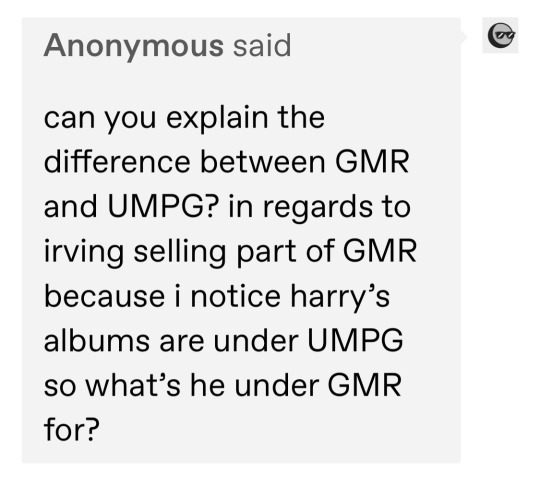
These questions are in reference to this anon I got last night:
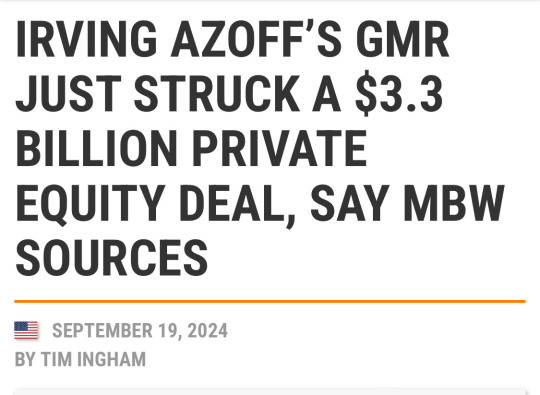
As far as I understand (and please someone correct me if I’m wrong or left something out), GMR is a Performance Rights Organization (PRO) like ASCAP, SEASAC, or BMI.
What is a PRO?
The way people and businesses play, purchase, listen to, and consume music has changed drastically in recent times. Revenues related to purchases of physical media and downloads are fading. Now, the attention is turning more than ever towards other sources of royalty revenues, such as performance rights. PROs play a major role collecting these rights and they monitor the compliance of businesses playing music in public.
PROs are in charge of administering the rights of songwriters and publishers. These duties include the collection and distribution of royalties on their behalf. It would be practically impossible for these creators to pick up their royalties one by one. There are too many instances, from digital platforms to physical venues, in which where their rights are being used. This network of agencies work to make sure that people pay all the royalties. In order to do this, they have close contact with different music platforms and checking physical locations, to collect and distribute them on the creators behalf.
x
From what I understand, Azoff’s stated intention in forming this group was to make sure artists were paid their fare share of royalties, given that the rules hadn’t been updated to take into account the current ways people consume music.
From GMR’s website:

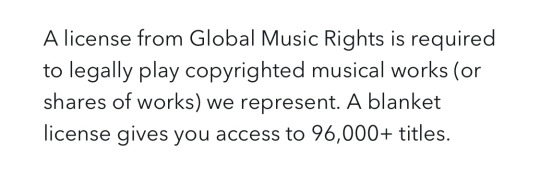
x
Basically, any business that uses music (or portions of music) in a public way must pay to license that music from GMR (or any of the other three PROs).
Who needs to buy a license?
So, if you have a restaurant that plays music in the background, if you use music when people are out on hold when they call your business, if you have a store that plays music while people shop… you have to have a license so that the artists/songwriters are paid each time their work is used.
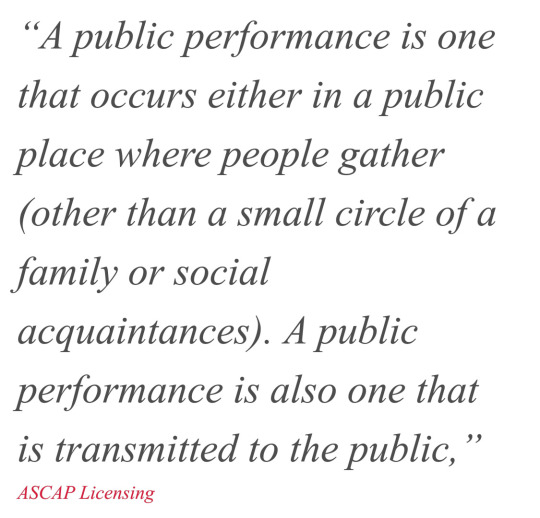
More details here x
Are there any exceptions? Yes.
The only exception is for broadcast radio and tv in businesses under 2000 square feet (3750 square feet for restaurants). Note: this rule applies only to “over-the-air” broadcasts, not internet streams or any other source of music. You’ll also be playing any DJ banter, unfiltered lyrics, and commercials for your competitors. Plus, there may be additional fees based on your type of establishment. For example, if you own a restaurant or bar that features live music, if there is a fee for entering your establishment, or if there is a physical activity coordinated with the music (such as public skating or dancing).
x
What is UMPG?
UMPG is an enormous music publishing company that offers a variety of different services. These range from administration services to creative services and much more.
They offer their services to companies including Universal Pictures, Warner Bros. Pictures, Lionsgate, MGM, Paramount, Disney Europe (and other territories), Viacom, Amazon, HBO, DreamWorks, DreamWorks Animation, Legendary Pictures, Mar Vista Entertainment, NBC and Sesame Workshop, among many others.
Universal Music Publishing Group’s Film & TV Department creates opportunities for and licenses their catalog of songs to film, television, advertising, computer games, and stage production. This is often referred to as ‘synchronization’.
x
UMPG focuses on traditional music publishing, licensing songs for use in film, TV, commercials, and more, and handling royalties for its songwriters. GMR focuses on managing public performance rights for a select group of high-profile artists. It offers more personalized and tailored services but is invitation-only, making it more selective and exclusive than UMPG.
Harry seems to have his music listed with both companies, as they handle different aspects of royalties.
TL;DR As far as I can tell (and I'm far from an expert), this all boils down to:
Erskine Records is primarily concerned with the release and distribution of Harry's music, partnering with Sony for wider reach. This covers the production, distribution, and promotion aspects of his music.
UMPG (Universal Music Publishing Group) manages his publishing rights. They handle songwriting royalties, licensing his music for use in films, TV, commercials, and other media, and collecting royalties when his songs are performed, played on the radio, or streamed online.
GMR (Global Music Rights) deals with performance rights. They ensure that when Styles' music is publicly performed (e.g., at concerts, in public spaces, etc., as explained above), the proper royalties are collected and distributed to him.
Additionally, we don't know how much of the GMR catalog has been sold. Nor do we know what the private equity firm plans to do with what it's bought. From the bit of research I've done, it seems that there is a move toward selling catalogs to private equity firms. For those firms, owning these rights is about more than passive income—it's about actively enhancing the value of the music through aggressive licensing, smarter technology, and even repackaging or reselling portions of the catalog for a higher return.
More info on that here and here
That's the best I can offer for now.
#long post#irving azoff#global music rights#erskine records#harry's career#music business#music industry#gmr#gmr sells catalog
23 notes
·
View notes
Text



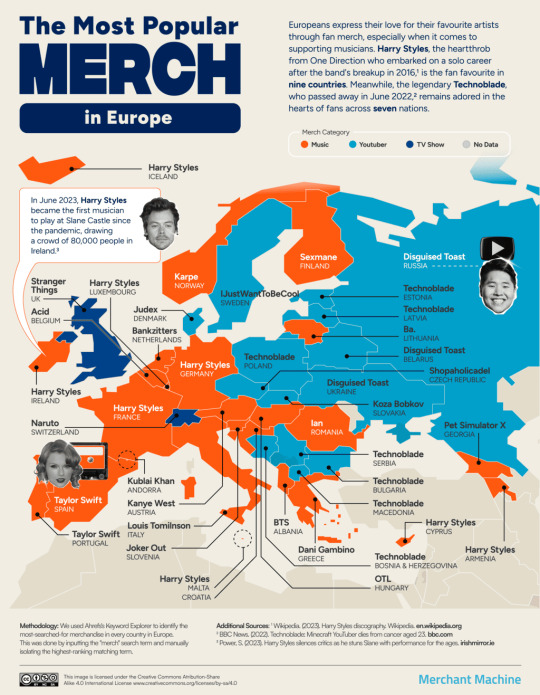


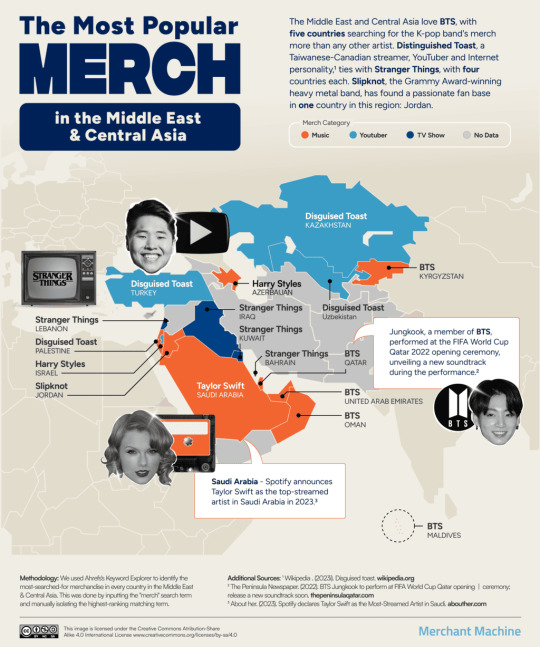

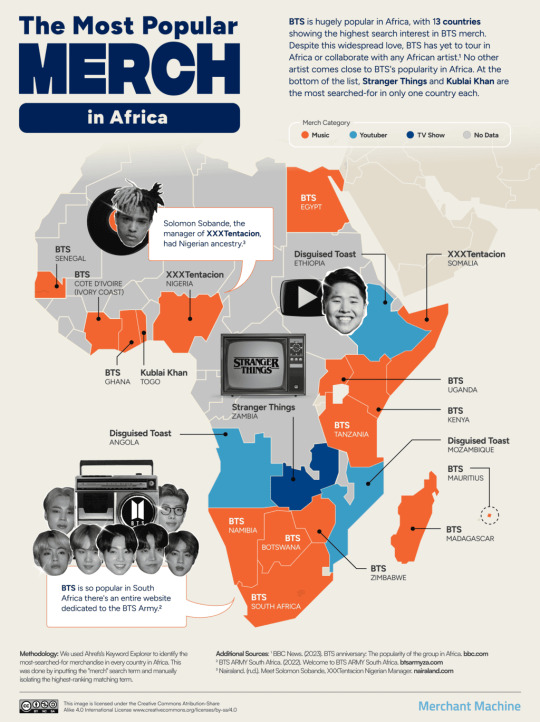
Harry’s is the 3rd most popular merch in the world and The number 1 most popular in Europe.
Louis’ is the most popular merch in Italy.
Read the full article here
76 notes
·
View notes
Text

8 notes
·
View notes
Text
From Pennies to Progress: How Pluto in Aquarius is Shaping the Music Industry with the Living Wage for Musicians Act
A recent bill introduced in Congress, the Living Wage for Musicians Act, is shaking things up in the music industry. But this isn’t just about fairer pay for artists — it’s a potent symbol of the astrological shift we’re currently experiencing with Pluto in Aquarius.
For those astrologically inclined, Pluto — the planet of transformation and revolution — has been transiting Aquarius, the sign of innovation and community, since 2023. This transit signifies a period of deep change for social structures, particularly those that have become outdated and inequitable.
The music industry is a prime example. Streaming services have revolutionized music consumption, but for many musicians, it’s a race to the bottom. Current royalty rates mean it takes millions of streams to earn a meager living. The Living Wage for Musicians Act proposes a minimum payout of one cent per stream, a significant increase that would offer a crucial lifeline to countless artists.
This act embodies the Aquarian spirit of progress. It challenges the status quo, prioritizing fairness and collective well-being over the profit margins of a few. This aligns perfectly with Pluto’s transformative power. The current system, where a select few reap the rewards while the creators struggle, is being dismantled.
Here’s how the Living Wage for Musicians Act reflects the influence of Pluto in Aquarius:
Strength in Numbers: How Aquarius Fuels the Collective Action Behind the Living Wage for Musicians Act
The Living Wage for Musicians Act isn’t just about a single politician championing a cause. It’s a powerful symbol of collective action, a concept deeply rooted in the astrological sign of Aquarius. Aquarius, with its emphasis on community, progress, and social change, thrives on collaboration and working towards a common goal. This collective spirit is precisely what’s driving the Act forward.
Here’s how the Aquarian influence manifests in the fight for fairer pay for musicians:
Uniting Diverse Voices: Aquarius transcends individual differences. The Act isn’t just about musicians; it’s a collaborative effort. Legislators, artist unions, and individual musicians have come together, recognizing their shared interest in fair compensation. This united front increases the Act’s visibility and strengthens its impact.
Community Power: Aquarius celebrates the collective. The Act isn’t a top-down decree. It’s a grassroots movement fueled by the collective power of the music community. Musicians are using their voices and platforms to raise awareness, garnering public support for the cause. This community power is a potent force that legislators can’t ignore.
Progress for All: Aquarius is a humanitarian sign. The Act isn’t just about individual gain; it’s about creating a fairer music industry for everyone. By securing a living wage, musicians can focus on creating art without financial anxieties. This ultimately benefits music fans who get to enjoy a richer and more diverse musical landscape.
The Aquarian spirit that encourages collaboration, community building, and social progress is what’s propelling this Act forward. With musicians, unions, and legislators working together, the fight for fair pay becomes a powerful force for positive change in the music industry.
Reimagining the Model: How Aquarius Embraces Tech to Drive Fair Pay in the Living Wage for Musicians Act
The rise of streaming services revolutionized music consumption, but for many musicians, it’s been a double-edged sword. While their music reaches a wider audience, current royalty rates make it nearly impossible to earn a living wage solely through streaming. The Living Wage for Musicians Act acknowledges this reality and embraces the power of technological innovation, another hallmark of Aquarius. This astrological sign thrives on progress and isn’t afraid to challenge the status quo. The Act leverages existing technology to create a new, more equitable compensation model for the digital age.
Here’s how the Act embodies the Aquarian spirit of technological innovation:
Adapting to Change: Aquarius is all about embracing the future. The Act recognizes that streaming is the dominant form of music consumption and doesn’t try to fight a losing battle. Instead, it proposes a solution that works within the existing technological framework.
Harnessing Existing Tech: Aquarius encourages using technology for good. The Act doesn’t require complex new systems. It proposes a tweak to the existing streaming model — a higher per-stream payout — that leverages the same technology platforms musicians already use
Building a New Future: Aquarius is a visionary sign. The Act isn’t just a temporary fix. It aims to create a sustainable model for artist compensation in the digital age. By ensuring musicians earn a living wage through streaming, the Act paves the way for a more vibrant and equitable music industry for years to come.
The Living Wage for Musicians Act isn’t a rejection of technology. It’s a testament to the Aquarian spirit of embracing innovation to solve problems and create a better future. By leveraging existing technology in a new way, the Act proposes a solution that’s both practical and forward-thinking. This innovative approach could revolutionize the way artists are compensated in the digital age, ensuring that music continues to thrive.
Challenging Power Structures: Pluto dismantles what’s no longer working. The Act challenges the current power dynamic in the music industry, pushing for a fairer distribution of wealth.
Disrupting the Status Quo: How Pluto in Aquarius Fuels the Fight for Fair Pay in the Music Industry
This isn’t just about raising artist compensation; it’s a challenge to the very foundation of the music industry. This audacious spirit aligns perfectly with the astrological influence of Pluto in Aquarius. Pluto, the planet of transformation and revolution, is currently transiting Aquarius, the sign of innovation and social justice. Together, they create a potent force for dismantling outdated systems and demanding a more equitable distribution of wealth.
Here’s how the Act embodies the transformative power of Pluto in Aquarius:
Shifting the Balance of Power: Aquarius seeks equality, and Pluto dismantles what no longer works. The Act challenges the current power dynamic in the music industry, where a select few streaming platforms and record labels hold immense power over artists’ livelihoods. By demanding a fairer share of revenue, the Act aims to redistribute wealth and give artists more control over their careers.
Exposing Inequalities: Pluto shines a light on hidden truths. The Act exposes the current royalty system’s unfairness, highlighting the disparity between the massive profits generated by streaming services and the meager payouts received by artists. This awareness is crucial for building public support and pressuring the industry to make a change.
Building a New Paradigm: Aquarius envisions a better future. The Act isn’t just about fixing a broken system; it’s about creating a new model for artist compensation in the digital age. By establishing a living wage for musicians, the Act paves the way for a more sustainable and equitable music industry where artists are valued for their contributions.
The Living Wage for Musicians Act isn’t a small-scale reform. It’s a direct challenge to the status quo, fueled by the transformative power of Pluto in Aquarius. By dismantling the existing power structures and demanding fairer pay for artists, the Act paves the way for a more just and sustainable music industry for everyone involved. This fight isn’t just about musicians; it’s a symbol of a larger societal shift towards a more equitable distribution of wealth and power.
While the artistic fire burns bright within creatives, neglecting the business side of things can leave them vulnerable. The music industry, for example, is full of cautionary tales of talented artists who are financially exploited simply because they lacked the knowledge to negotiate fair deals or manage their finances effectively. Building a strong business foundation doesn’t diminish the creative spirit; instead, it empowers it. By understanding basic business concepts like marketing, budgeting, and intellectual property rights, creatives can take control of their careers, secure fair compensation for their work, and ensure their artistic endeavors have a sustainable future. This allows them to focus their energy on what they do best — creating — without the constant worry of financial instability. In essence, a strong business foundation becomes the essential toolbelt that allows creatives to translate their artistic vision into a thriving and sustainable career.
This act is just one example of how Pluto in Aquarius is playing out. As this transit continues, expect to see more social and economic reforms that prioritize equality and innovation. Whether you’re a music lover or an astrology buff, this is a fascinating time to witness a transformation that could reshape the way artists are valued and compensated.
#business astrology#music business#entertainment news#entertainment business#astrology updates#astro#astrology facts#astro notes#astrology observations#astro posts#astrology#astrology community#astro girlies#astropost#astro observations#astrology notes#astro community
27 notes
·
View notes
Note
Hi! I sent the anon about the BMG article - I can't link but it's online if you want to
Here’s the article, and I’ll excerpt:

SO WHAT’S BMG’S SECRET?
Number one, and it sounds obvious, make a great album. In the early days of the new BMG, we were very much artist services: you delivered a record, we released it for you.
Under Korda [Marshall, former BMG SVP] and now Jamie, the A&R element is very important. With all of the examples we could look at, the records are very good – but that doesn’t necessarily mean they’re going to be successful.
The second element, in almost every example, is they have great management. The partnership between the label and the artist manager is so integral.
And the third element is the excitement and determination coming from the artist themselves. If it’s, ‘We’re going on tour, we should put a record out to support the tour’, that’s OK, but it’s not being driven by the music. I’ve had artists in here who’ve said, ‘This feels like the first roll of the dice’, even though it’s many years later.
IS IT HARDER TO DO THOSE DEALS NOW YOU’RE UP AGAINST VENTURE CAPITALISTS?
The problem is, we’ve seen a lot of overheated deals that have inflated prices and it’s very hard then to say to somebody, ‘This is what your catalogue is worth’, because they’re like, ‘Well, so-and-so got that much’.
If you’re selling a portion of your catalogue, but you’re still going to be out there performing and releasing new music, it’s important you have a company that’s a proper publisher or label. We will always curate and look after your legacy better than a fund will do, because we know how to administer songs and release recordings.
WOULD YOU LIKE TO HAVE MORE ACTS SIGNED FOR BOTH RECORDS AND PUBLISHING?
The balance is good. What we’ve never done is pressurise or make anything contingent on one or the other.
I enjoy the fact that lots of our writers are signed to other labels. Since Thomas took over, you’re seeing more engagement with the industry. Our communication historically was a little bit, ‘We’re out on our own, BMG is the new music company’. I always felt we were somewhat detached from the industry.
Now we’re shifting our physical distribution to Universal from October, going direct to digital and building our relationships with DSPs, you’re starting to see people joining BMG from the majors, particularly in the US and UK; you didn’t see that before.
The industry needs to be more collaborative. The Ivors is the best awards show because it’s the publishing industry coming together, acknowledging and rewarding everybody else’s success.
There’s always a feeling in the room of collaboration. The BRITs is more competitive, you support your team. But music publishers are used to sharing songs; we share the song, so we share the success.
HOW HAVE THOMAS’ [CEO Coesfeld] CHANGES AFFECTED THE WAY YOU WORK?
The biggest change Thomas has made is the focus on just being a publisher and a record company. It was great to be able to make documentaries and co-produce films but, on reflection after 12 months of not doing that, this is a much better way to run a business – to be super-focused on the core business of music publishing and records.
The other big change, which perhaps hasn’t been explained as well as it should have been, is the change to how we’re working internationally.
We had created a large international hub in Berlin and local marketing was going via Berlin. That team was disbanded last autumn, and there was a discussion in the industry about ‘BMG bailing out of international’ – which was totally contrary to what we are doing!
Now, with UK projects being marketed in America, they’re not going through a central hub, there’s just direct communication from London to Los Angeles.
CONVERSELY, IT SEEMS TO BE A VERY TOUGH TIME FOR BRITISH ARTISTS INTERNATIONALLY…
If we were exclusively focused on breaking talent, it would be very difficult. But the world we’re in and the artists we’re working with… I look at Simple Minds; next year will be the biggest US tour they’ve ever done. I look at Louis Tomlinson; his touring is going from strength to strength.
That Suede/Manics tour began in the US. I remember going to the Brooklyn show and thinking, ‘This is the smart way for UK acts to team up’. You’re getting bigger audiences at less cost and you’ll see more of those package tours, they’re excellent.
It is harder than it’s ever been, but the lane we are in gives me confidence that we can work within the parameters of the current climate.
DOES BMG STILL WANT TO TAKE ON THE MAJORS?
One has to be realistic. Frankly, you’re not going to take [them] on. We want to be competitive, but we’re seeing much more of a collaborative spirit.
It should be a healthy, competitive marketplace but there are so many examples now where artists are featuring on other people’s records… So many records are X featuring Y and it involves two labels, one of them is the releasing label and the other one shares in the revenues.
There’s a lot more partnership coming and an artist doesn’t want to hear that you don’t get on with this label, because that’s buggering up their plans.
When we started, we had to be disruptive and agitate. But, as an industry, we’ll be stronger if we’re more aligned than if we fight with each other.
WHAT ARE YOUR PRIORITIES OVER THE NEXT FEW YEARS?
To be more impactful internationally. To support the doubling down in the US, by signing the records and artists that can be meaningful in America, and moving into stadium artists.
In 2018, we were in theatres. Now we’re in arenas. Our job is to demonstrate to those artists that we are a serious contender at that [stadium] level.
We’re proud to publish Dave Rowntree from Blur – we could do a Blur album. I’m proud to do the neighbouring rights for Coldplay – we could do a Coldplay record. I’m proud to have worked with Bono on the Peter And The Wolf project – we could do a U2 record. I’m proud to publish Matt Bellamy – we could do a Muse record.
Every time you think maybe BMG has run out of runway, it hasn’t. And, because of the way the industry’s going, there are more opportunities coming. This is a good time to be at BMG.
So what I’m getting out of this:
1. BMG takes a lot of its cues from the artists and their managements. It isn’t comfortable taking big risks unless that’s what the artist wants to do.
2. BMG is more comfortable working with established acts who have a firm fanbase. It has neither the money nor manpower to break new acts or to significantly grow old ones. The BMG A&R department is more about connecting established artists to other creatives in industry, not breaking unknowns.
3. BMG takes a smaller slice of the pie from artists because established artists negotiate better terms for themselves. Just like we’ve seen with Louis, BMG relies on fans to pick up whatever their artist is doing.
4. BMG is not competitive in the USA. They’ve not been able to expand in the biggest English-speaking market in the world, and that really impacts them globally since USA charts affect so much global listening. Maybe Louis’ Eurocentric focus is a consequence of BMG’s Eurocentric business. It’s more complicated than just one factor, but it might partially explain the difference of Louis’ success in the USA with Niall, who is with one of the big three.
5. Venture capital is really turning the creative arts into big business, in a bad way. The same way venture cap has locked young people out of home ownership and savings, it’s killed the careers of young people breaking organically into music. Now every artist is seen as the worth of their tours and future catalogues. That means fewer artists make it through, less risk, more generic-sounding, corporate-approved, AI-generated bullshit.
6. Louis is doing fine. He’s staying with BMG, not going anywhere. He is a nice bright spot at BMG, but not on the order of Kylie Minogue. Louis is an arena-sized touring artist, at least in the USA and Europe, at least for the foreseeable future.
8 notes
·
View notes
Text
8 notes
·
View notes
Text
Helpful tip for musicians! Reblog if you agree, smash that like button subscribe to my patreon and business coaching program and you too can achieve the same level of social media brainrot that I obviously have
6 notes
·
View notes
Text
instagram
#coi leray#foodie#coileray#female rap artist#coilerayfanbase#coilerayfandom#coi the album#music business#megan thee stallion#big latto#latto#lola brooke#nicki minaj#Instagram
39 notes
·
View notes
Text
You know it's just passing [the mic] around to men to men to men. So finally, I'd have to tap somebody on the shoulder and be like, 'Yo, I've been standing here. Can I get on the mic?'"
-Monie Love speaking about the music industry being male dominated
6 notes
·
View notes
Text
It's not just the Black Keys. Why are so many big tours selling poorly? Stereogum | June 11, 2024 | by Zach Schonfeld
long (and US focused) but still quite interesting article on the current state of concert touring, why tours are getting cancelled or downsized, and what's up with ticket pricing. (my selected excerpts/highlights under the cut)
[excerpt, all highlights mine]
[Eric Renner Brown, a senior editor at Billboard] adds, “I do think [The Black Keys] are an artist that can fill those rooms still. I think the demand is there in terms of people who want to see Black Keys. But perhaps at that price point, the demand was not there.”
Ostensibly, agents and promoters should have access to data that can give them a better sense of demand. But they often place outsized importance on raw streaming numbers.
“The data is very confusing,” says the anonymous booking agent. “There’s a lot of passive listeners for data. You can have millions upon millions of streams, but that doesn’t mean it’s gonna turn into tickets. The opposite is, there are some artists who don’t have many streams at all and they can sell like 2,000, 3,000 tickets.”
[..]
It’s worth noting that the Black Keys have released four albums since returning from hiatus in 2019, and toured arenas as recently as 2022. This may be a case of oversaturating the market.
The band’s 2019 and 2022 arena runs weren’t exactly sold out. In between, the band left their longtime manager in 2021, signing with Irving Azoff and Steve Moir at Full Stop Management. Some sources speculate that Azoff, a former CEO of Ticketmaster, may have encouraged ambitious touring plans. On Thursday, Billboard reported that the group has now parted ways with Azoff and Moir. (The management company did not respond to a request for comment.)
“Essentially, you have some very big managers that are out of touch with the granular finesse and nuance of ticketing,” says another anonymous booking agent. “And they have these large expectations and they tell their agents what they want. And the agents are probably texting each other on the side, going, ‘This man is out of his fucking mind.’ But they do it anyway because, in the case of Black Keys, they’re not gonna challenge Irving Azoff.”
[..]
One contributing factor to instability in the touring industry is the rising cost of… well, everything. It’s part of why ticket prices are so high; it’s also part of the reason some acts are backing out of touring commitments.
Bands at all levels have been sounding the alarm about this for years. In 2022, for instance, Animal Collective canceled European tour dates and explained, “We simply could not make a budget for this tour that did not lose money even if everything went as well as it could.”
Industry insiders say that’s not uncommon. “Everything is ridiculously expensive,” says a tour manager who works with major acts and asked not to be named. “There’s not enough gear for everyone to share, so the vendors are having to pay high amounts for equipment. A single bus for a six-week tour can cost $100,000. Multiple that by multiple buses, and then trucks, and then crews are at a minimum, so they’re getting top rate right now because there’s not enough crews.”
COVID, of course, exacerbated this crunch. “What happened after the pandemic is, everyone was ready to tour at once,” the tour manager says. “There’s not enough gear to cover all of that. A lot of bands have had to cancel tours because they don’t have gear or they couldn’t afford the gear,” the tour manager continued. “I was on a tour with somebody last year where we had to book a private jet because there were no buses available. For the first week of the tour, we had to charter planes.”
Acts are thus incentivized to book bigger venues to recoup the costs of touring. The catch-22 is that bigger venues necessitate more elaborate stage production, which makes for a more expensive tour.
“There’s the expectation to have that production,” says the tour manager. “If people went back to having just two trusses of lights and a P.A. and no frills, it was just about the music, they can afford to tour. But everyone wants to see those flashing lights. Everyone wants to see that video.”
“So much of the economics of these big tours is completely invisible to fans and consumers,” says Kevin Erickson, director of Future of Music Coalition, a nonprofit advocacy group. “You can sell out a tour and come back in the red if there was a cost overrun or a miscalculation.”
For mid-level acts with sizable followings, these frustrations are compounded by a lack of suitable mid-sized venues.
“For a band that maybe has assessed its demand in the market to be in the 8K range or something for capacity, where are they going to go if that sort of venue doesn’t exist?” says Brown. “And if, say, the local theater that seats 3K or 4K can’t accommodate two or three nights, it can only put them for one night on the tour routing. That’s a real concern.”
[..]
At the end of the day, it all comes back to price. The average ticket price for one of the top 100 tours rose from $91.86 to $122.84 between 2019 and 2023. Concerts are too damn expensive, and there’s a growing sense of consumer frustration with shows that cost as much as airline tickets.
-> read the full article here on Stereogum.com
#recommended reading!#this should answer a lot of questions for everyone who were up in arms after the asian tour cancellation last year...#about the current touring climate and costs#streaming numbers ≠ ticket sales#..should not be that big a surprise for industry people and yet..#also that azoff anecdote.. who's surprised lol#touring#music industry#live music#article#stereogum#11.06.24#the black keys#music business#link#m
54 notes
·
View notes
Text
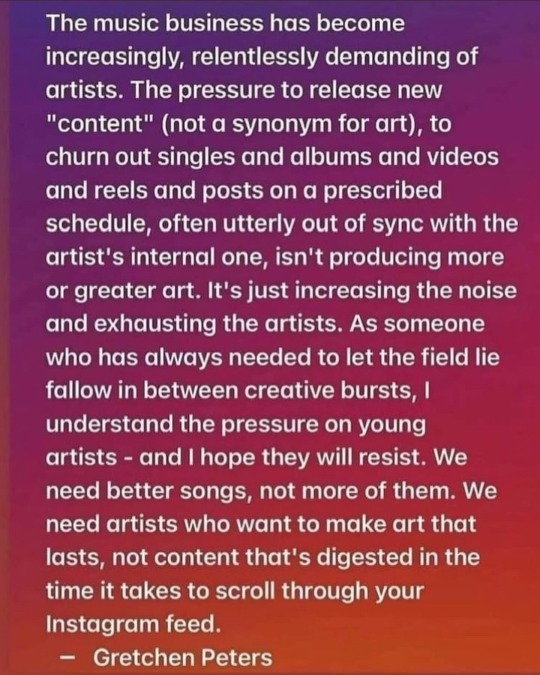
24 notes
·
View notes
Text
This video from Justin Tranter who is explaining how songwriters make money from radio plays vs streaming.
Justin Tranter is a queer songwriter and producer who now owns his own label. He’s written some super successful hits and most recently wrote Chappell Roan’s Good Luck, Babe.
For folks interested in how streaming has changed the financial game for musicians, his TikTok really informative. This video is one of a series where he’s breaking these ideas down.
I mention because One Direction was really only at the tail end of streaming before hiatus.
4 notes
·
View notes
Text
Marketing, Positioning and Branding with Christian principles ( with Bible verses)

View On WordPress
#Bible#Bible study#brand#branding#business#Christian#Christian faith#Christian hip hop#Christianity#english#Marketing#music business#philosophy#positioning#thinkers#thinking
3 notes
·
View notes
Text
Bruh can we please make getting paid more simple🤦🏾♂️ Fuck Spotify
#las vegas#emo boy#indie music#underground hip hop#dark hip hop#rapper#alternative hip hop#emo rap#independent artist#spotify#music business#corporate greed#law#legal#artists on tumblr#fuck spotify#fuck streaming services#mlc#news#small business#business#music#independent music#music industry#give me my money#fuck capitalism
3 notes
·
View notes